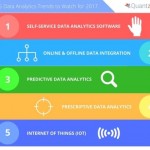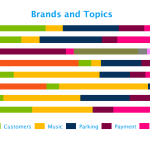Operational Analytics is Where We Should Be Headed!

Operational Analytics is Where We Should Be Headed!
From a data perspective, a lot of maturity in terms of data has come in to most of the leading organizations in this space. Firstly, for the leaders in the manufacturing, Consumer goods and financial service space, the maturity in terms of analytics is not less than what one would find in any global organization. Secondly, they have moved very quickly from a maturing phase to a matured phase, that is, the time taken by these organizations to adopt analytics is very less; thirdly, even in India we see a lot of focus around operational efficiency and operational analytics. For instance, in industries, maintenance is schedule based, where in the maintenance is done on a monthly basis or yearly basis. But now the trend is moving towards need basis maintenance. While looking at analytics, there are a lot of other technologies that have come into play like social, IoT etc. Indian organizations are also taking a lot of interest in leveraging analytics in order to operationalize their supply chains and core processes as well.
In the traditional world of BI, we had descriptive analytics or dashboards etc, which were delinked with the core operational systems. In the BI world there used to be a term called Close Looped BI, but it never really happened, because the BI systems were always separated out from the operational systems. Unless those insights are at the point of action, which is where the decision making happens, a lot of it becomes irrelevant. Our overall process is based on 7 guiding principles, one of them being to develop data science as a culture within client organization, and the last is to drive insights into action. In the analytics world today, organizations ask a lot about how to use event processing, how to use workflow system to automate some of the decision making processes. So it has become more about what actions one can take specifically rather than leaving it to the individual. So that is what analytics can do t today than what it could do a couple of years ago.
The Study: “Going Big: Why Organizations Need to Focus on Operations Analytics”
In March of this year, we interviewed 600 folks of the CXOs community in order to understand what are the present priorities of analytics and the concurrent focus. The study covered different geographies in different sectors, including consumer products, automotives, manufacturing utilities and life sciences. 70 percent of the organizations that participated have been looking to use analytics for operational efficiencies compared to the consumer facing analytics. Resultantly, analytics for operation was very strategic for all the organizations. Also, it was discovered that US was leading the pact followed by Europe, where within Europe, Germany was leading. From a ROI perspective, 20 percent of the organizations studied have already got benefited through such implementations.
From the study conducted we found few things pretty impressive and pleasant. Firstly, the organizational focus is shifting back into operational analytics. Secondly, a lot of customers and users have started measuring the benefits that they are enjoying due to analytical initiatives. Traditionally in the BI world we always found the calculation of ROI quite difficult, but today with analytics being embedded in the business process itself it’s a piece of cake. Thirdly, operational analytics help consumers for better product delivery, customer service and also enable them to be more efficient on how they address both their products and the services.
A lot of our center for excellence is based out of India centers. Which means the solution development and identification of what we take out in the market happens in the India center. The reason is very simple – firstly talent is available in abundance and secondly India is the hub for Capgemini to deliver to some of our global customers. India becomes the natural place to accumulate some of our best practices. As far as the first reason is concerned India is a talent pool since half of our total 14000 workforce in insights and data are based out of India.
Author: Venkat Iyer, VP-Insights & Data, Capgemini Source: CIO Review

Kalyan Banga226 Posts
I am Kalyan Banga, a Post Graduate in Business Analytics from Indian Institute of Management (IIM) Calcutta, a premier management institute, ranked best B-School in Asia in FT Masters management global rankings. I have spent 14 years in field of Research & Analytics.











0 Comments